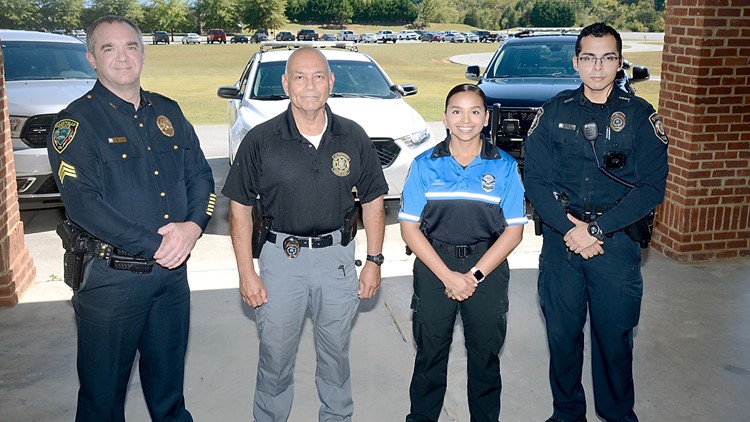MARYVILLE, Tenn. — Blount County Sheriff’s Deputy Rob Lopez didn’t believe there was much of a Hispanic community in Blount County when he began working for the sheriff’s office last year. It wasn’t until he began patrolling the streets that he realized what he had heard from his fellow deputies was true.
According to Lopez, the Hispanic community in Blount County is growing — and as the child of Mexican immigrants, that makes him feel like he’s doing something special.
“Sometimes, I’ll see a young Hispanic kid, and I can see it in their face — the same reaction I had when I was their age and I saw another Hispanic officer,” he said. “Like, there’s someone like me who’s doing that job.”
Sept. 15 to Oct. 15 is officially National Hispanic Heritage Month. Codified by President Reagan in 1988, the month seeks to celebrate the cultures and traditions of people of Hispanic heritage throughout the United States. And though there are not many members of law enforcement with Hispanic heritage in Blount County, Lopez is not alone.
Alcoa Police Sergeant Alexis Rodriguez, for example, is particularly proud of the work her fellow Hispanic officers have done to serve their communities in Blount County.
“In our culture, we are taught to be selfless and to work hard, and that is the true core of law enforcement,” she said. “So this career choice only makes sense for us to reflect the community we serve and bring diversity and a much-needed skillset to our departments.”
Rodriguez has worked with APD for seven years, rising through the ranks to her current position of training sergeant. In her eyes, one of her unique strengths comes from her heritage. Both of her parents immigrated to the United States from Mexico, and she grew up speaking both English and Spanish.
“Sometimes they give me the call because they know I’m going to be able to handle the call a little bit more efficiently,” she said. “And a lot of times, even if I’m not working, officers will call me and I can interpret for both sides.”
According to the U.S. Census Bureau, roughly 4% of Blount County residents identify as Hispanic. That may not be much, but it’s enough that Rodriguez is often dispatched in situations where her skills will allow her to do more than the average officer in her department.
She’s not alone, either. Lopez also finds himself often responding to incidents where he must speak in Spanish, as not all Hispanics in Blount County are able to speak English.
“There’s always going to be a need for a Spanish-speaking officer,” he said, going on to state that heritage runs much deeper than language. Oftentimes, he is able to de-escalate a situation simply by being there. Being a good deputy means serving the entire community.
“I’ve been to calls where I can sense tension when I get there because of that language barrier,” he said. “But when I start talking Spanish to them, I can see the change in their body language. It’s like they’re talking to a friend.”
Prizing the ability to not only serve as a translator but also to make people feel at ease around law enforcement, is a sentiment shared by Cpl. Pete Rivas of the Blount County Sheriff’s Office.
Rivas, who has worked for the Office since 2004, tries to impress on the recruits he trains that their role as law enforcement is to build the trust of the community. That isn’t always easy, as the public’s perception of law enforcement can be affected by the past.
“There’s a misconception, especially among older law enforcement that their job is just to enforce the law,” he said. “And we try to tell them our job is to go out there and become part of the community.”
Working as law enforcement with the Hispanic community, he said, can have its own challenges. He has seen some families with roots and recent history in nations where police are not trustworthy, and that poses a problem to deputies trying to form connections. It’s a challenge Lopez has seen as well when dealing with recent immigrants.
“In some places, people don’t tend to look to law enforcement for help,” he said. “When people move to the states, they still have that fear. They’re afraid of what law enforcement is going to do, or what they’re not going to do.”
Rodriguez, too, has encountered instances of distrust she has had to overcome. In her eyes, she and her fellow Hispanic officers and deputies have a unique ability to connect with the Hispanic community in the county. That ability, she said, lends itself to a responsibility to act.
“You’re combating not only what we’re dealing with here nationally, but you’re also combating what people have dealt with in their home countries. When they come here, it’s added pressure to build that relationship,” she said. “We want to let them know they are still represented here in the States and that we have that commonality of culture.”
Overcoming that distrust, she says, is one of the reasons she is so proud of her fellow Hispanic officers. By serving as police and deputies, she sees them as overcoming distrust of law enforcement and breaking down barriers in the process.
“I cannot express how proud I am of my fellow Hispanic officers in our area,” she said, “And what we have all accomplished in hopes of paving the way for other future Hispanic officers.”



